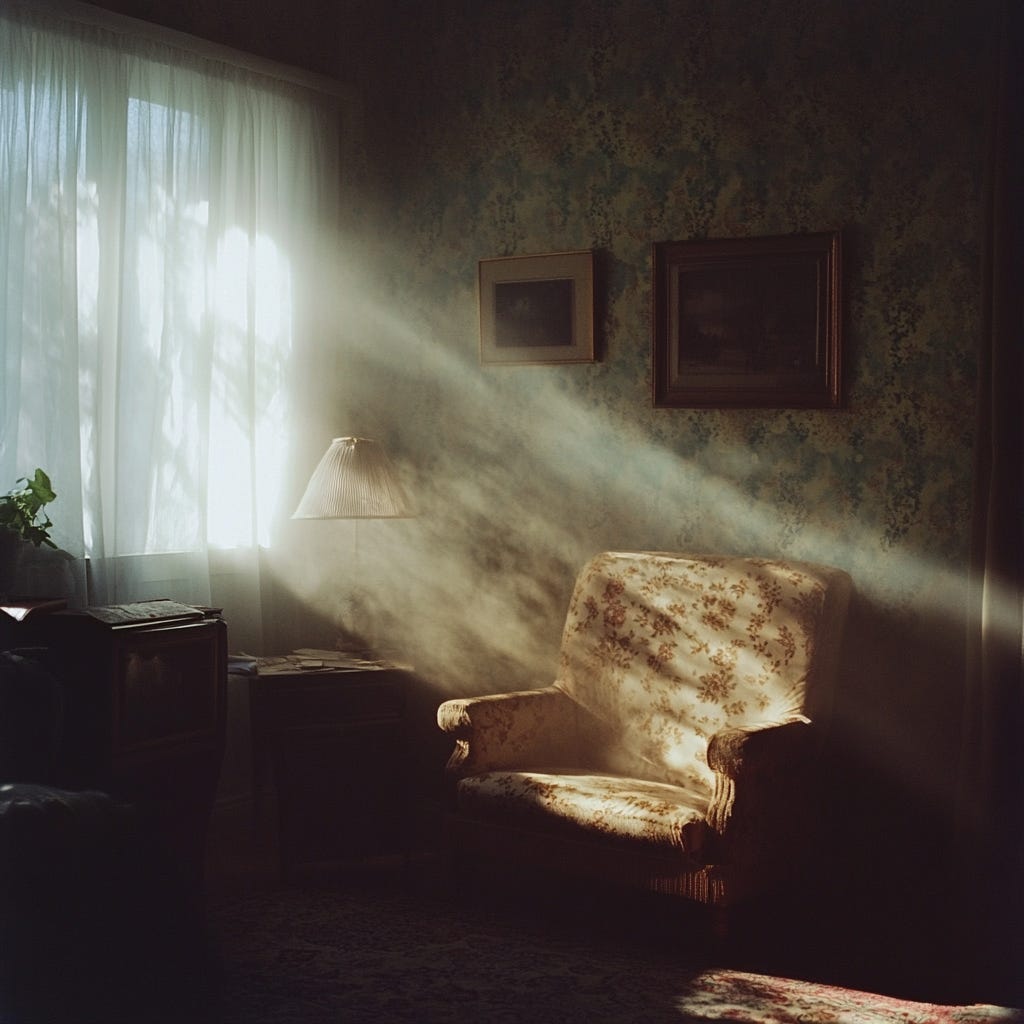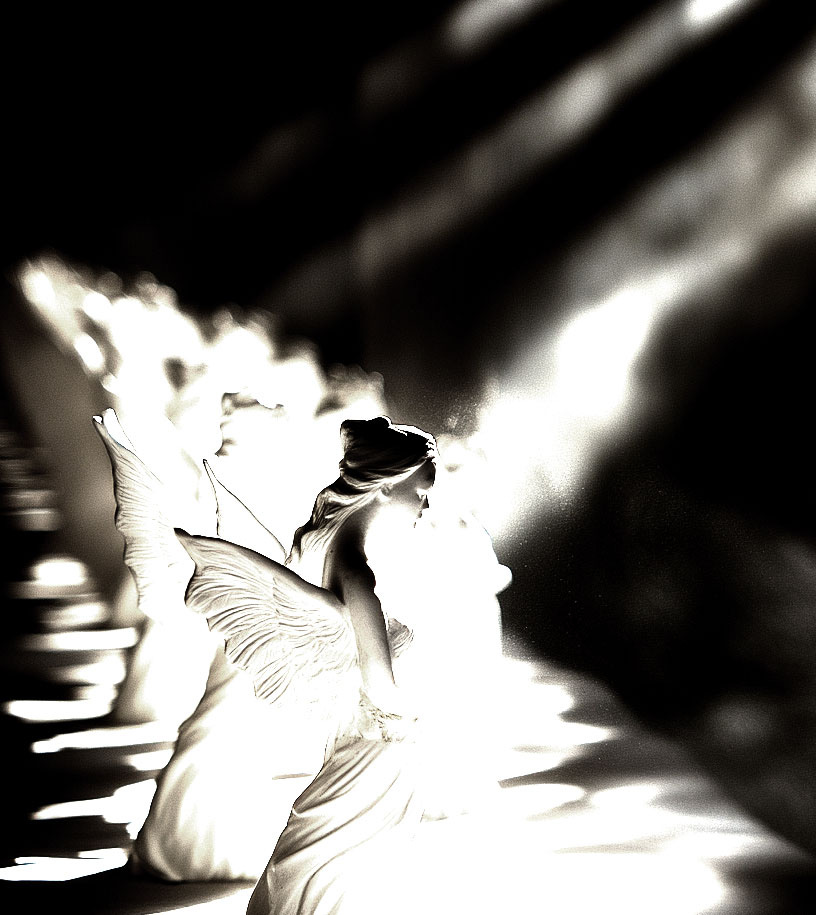Every morning, I wake up and thank Jesus for Pudding and for slippers. I say, "Jesus, and Pudding"—because Pudding’s right there, looking at me from her spot on my chest—"today I am thankful for the roof over my head and for my soft slippers, even with the little hole I can wiggle my toe in." I start at the top, with the roof, and I end at the bottom with my slippers. I don’t like to go much lower than my slippers… don’t want to go down to the roots and worms and the places the sun can’t warm. Some people don’t have that. Some people haven’t got any slippers at all.
I think of all these blessings, even the small ones, and wonder if maybe Georgy is right when he says not to be sad. I make lists of things I’m thankful for—everything I can think of, like Band-Aids, sliced bread, soft towels, policemen, milk, streetlights, and even the water in the toilet bowl. Pudding and I had a good laugh over that one, but not everyone has water like that. What right would I have to feel anything but thankful?
After breakfast, I sit by the window and watch the birds come to the feeder. “See, Pudding, they come to see us,” I say. Most days, she just watches, flicking her tail. But every once in a while, she gets that look in her eye, a hunter’s streak. “Pudding, you’re better than that,” I tell her, but I know she’s not. Just like the world isn’t.
The squirrels come too, chasing each other with their fluffy tails flicking. I thank the Lord for how they make me laugh with their bossy little battles. Watching them gets me thinking about things I want to say to Jenny when she comes. Like the time Pudding scooted up the carpet, her eyes wild as she waited to pounce. That’s what I’d tell Jenny—how Pudding looked like a lion on the plains.
Georgy calls once a week. Every time he says goodbye, there’s a quiet on the other end of the line that I can’t fill. I hold onto the receiver like I’m holding onto him, as if letting go means he’ll slip away. When he says, “I’m not your baby anymore, Ma,” I try not to cry. Sometimes he says it in a way that cuts, like when he was a boy, and I held on too tight, and he’d push me away, rough. I don’t tell him that I still see the soft arms of the boy I once held, just beneath the tough skin of the man. I tell him, “I’m not sad, Georgy,” and he says, “Sure,” like he doesn’t believe it. And when he hangs up, it feels like all the light in the room dims.
I don’t ask for much—this is all God’s plan, and I don’t want Him thinking I’m criticizing it. But I ask for small things sometimes. I ask that Georgy’s girlfriend could soften some—not be so sharp all the time. Maybe that would ease the tightness in his eyes. Maybe I could hear him laugh again, the way he used to, not in that mean, dry way he’s started doing. And when the shadows feel closer, I ask if the Lord could let my sisters in heaven come and touch my cheek every now and again. Just asking makes me feel better. I know He understands.
When Jenny finally arrives, it’s like she brings the sun with her. I’m always ready with something I want to tell her, but my thoughts sometimes wander. Jenny moves so fast, talking about her grandchildren or her troubles at the bank. I try to follow, but sometimes it feels like she’s moving faster than I can catch up with. I start studying the veins in her strong arms, the way she bustles around, and my mind drifts.
I think about strange things, like the zoo my grandfather took me to as a child. I remember the lions, their skins stretched tight over them, like there was something wrong underneath. I’d have this terrible thought that maybe there was a man under all that fur, curled under those moving muscles and veins, and when their muscles moved, it was like the man was coming through. And as Jenny moves around the kitchen, I catch myself staring at her arms, at the strength in them, and that same fear creeps back.
By the time I come back to myself, the moment has passed. I open my mouth, but nothing comes out. And Jenny’s already packing up, saying goodbye. Sometimes, just as I’m about to speak, Jenny finds one of my messes or lapses and says, “Oh no, Joy, not again, we talked about this.” Then I feel like a child, and she’s stern and impatient, and it’s sure she’ll leave before I can even start.
After Jenny leaves, it’s always quieter. The corners of the room grow darker. The shadows stretch out, slipping under the door like they’re creeping closer. I turn on all the lights, but somehow, they’re never bright enough. The night feels different from the day—there’s something in it that wants to come in, to reach me.
When the shadows get too close, I go to my angels. They sit on the shelf, all gifts from loved ones. I turn them around in my hands, looking at each of their little faces, each one so special. Sometimes I imagine them speaking to me. “Don’t be scared, Joy,” they’d say. “No one is ever alone.” I talk to them, too, whispering my prayers, hoping they carry my words up to heaven. It helps for a little while, but the angels can only do so much.
But when the shadows grow thick and feel almost human, that’s when I give it to Him. I take the crucifix from the wall, gripping it in my hands like a knife. I know it can cut through the darkness. I hold Him tight and say, “You can’t come past Him. You can’t.” And I feel it—the shadows shrinking back.
I squeeze my eyes shut, clutching the crucifix even harder, waiting for morning. Soon, the light will burn it all away, and I’ll be safe. As long as I hold on, I’ll be safe. I fall into sleep like that, still holding Him tight, knowing the shadows won’t dare to come back and that the morning will burn them all away.




This is beautiful.
Loved this, I was right there in the room.